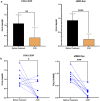Neutralizing tumor-related inflammation and reprogramming of cancer-associated fibroblasts by Curcumin in breast cancer therapy
- PMID: 38008819
- PMCID: PMC10679154
- DOI: 10.1038/s41598-023-48073-w
Neutralizing tumor-related inflammation and reprogramming of cancer-associated fibroblasts by Curcumin in breast cancer therapy
Abstract
Tumor-associated inflammation plays a vital role in cancer progression. Among the various stromal cells, cancer-associated fibroblasts are promising targets for cancer therapy. Several reports have indicated potent anti-inflammatory effects attributed to Curcumin. This study aimed to investigate whether inhibiting the inflammatory function of cancer-associated fibroblasts (CAFs) with Curcumin can restore anticancer immune responses. CAFs were isolated from breast cancer tissues, treated with Curcumin, and co-cultured with patients' PBMCs to evaluate gene expression and cytokine production alterations. Blood and breast tumor tissue samples were obtained from 12 breast cancer patients with stage II/III invasive ductal carcinoma. Fibroblast Activation Protein (FAP) + CAFs were extracted from tumor tissue, treated with 10 μM Curcumin, and co-cultured with corresponding PBMCs. The expression of smooth muscle actin-alpha (α-SMA), Cyclooxygenase-2(COX-2), production of PGE2, and immune cell cytokines were evaluated using Real-Time PCR and ELISA, respectively. Analyzes showed that treatment with Curcumin decreased the expression of genes α-SMA and COX-2 and the production of PGE2 in CAFs. In PBMCs co-cultured with Curcumin-treated CAFs, the expression of FoxP3 decreased along with the production of TGF-β, IL-10, and IL-4. An increase in IFN-γ production was observed that followed by increased T-bet expression. According to our results, Curcumin could reprogram the pro-tumor phenotype of CAFs and increase the anti-tumor phenotype in PBMCs. Thus, CAFs, as a component of the tumor microenvironment, are a suitable target for combination immunotherapies of breast cancer.
© 2023. The Author(s).
Conflict of interest statement
The authors declare no competing interests.
Figures







Similar articles
-
Treatment of cancer-associated fibroblast-like cells with celecoxib enhances the anti-cancer T helper 1/Treg responses in breast cancer.Naunyn Schmiedebergs Arch Pharmacol. 2025 May;398(5):6099-6112. doi: 10.1007/s00210-024-03641-3. Epub 2024 Dec 9. Naunyn Schmiedebergs Arch Pharmacol. 2025. PMID: 39652176
-
Curcumin suppresses the proliferation and tumorigenicity of Cal27 by modulating cancer-associated fibroblasts of TSCC.Oral Dis. 2020 Oct;26(7):1375-1383. doi: 10.1111/odi.13306. Epub 2020 Aug 10. Oral Dis. 2020. PMID: 32060973
-
The IL1β-IL1R signaling is involved in the stimulatory effects triggered by hypoxia in breast cancer cells and cancer-associated fibroblasts (CAFs).J Exp Clin Cancer Res. 2020 Aug 10;39(1):153. doi: 10.1186/s13046-020-01667-y. J Exp Clin Cancer Res. 2020. PMID: 32778144 Free PMC article.
-
Regulation of heterogeneous cancer-associated fibroblasts: the molecular pathology of activated signaling pathways.J Exp Clin Cancer Res. 2020 Jun 16;39(1):112. doi: 10.1186/s13046-020-01611-0. J Exp Clin Cancer Res. 2020. PMID: 32546182 Free PMC article. Review.
-
Metabolic Reprogramming of Cancer Associated Fibroblasts: The Slavery of Stromal Fibroblasts.Biomed Res Int. 2018 Jun 5;2018:6075403. doi: 10.1155/2018/6075403. eCollection 2018. Biomed Res Int. 2018. PMID: 29967776 Free PMC article. Review.
Cited by
-
Cancer associated fibroblasts and metabolic reprogramming: unraveling the intricate crosstalk in tumor evolution.J Hematol Oncol. 2024 Sep 2;17(1):80. doi: 10.1186/s13045-024-01600-2. J Hematol Oncol. 2024. PMID: 39223656 Free PMC article. Review.
-
Drug repurposing for cancer therapy.Signal Transduct Target Ther. 2024 Apr 19;9(1):92. doi: 10.1038/s41392-024-01808-1. Signal Transduct Target Ther. 2024. PMID: 38637540 Free PMC article. Review.
-
Mechanistic insights curcumin's anti-inflammatory in pancreatic cancer: experimental and computational evidence implicating IL1B interference via IL10RA upregulation and NLRP3/TLR3 downregulation.Front Cell Dev Biol. 2025 Jun 4;13:1601908. doi: 10.3389/fcell.2025.1601908. eCollection 2025. Front Cell Dev Biol. 2025. PMID: 40535567 Free PMC article.
-
Oxidative Stress and Inflammation: Drivers of Tumorigenesis and Therapeutic Opportunities.Antioxidants (Basel). 2025 Jun 15;14(6):735. doi: 10.3390/antiox14060735. Antioxidants (Basel). 2025. PMID: 40563367 Free PMC article. Review.
-
Extracellular vesicles isolated from curcumin-medium weakened RKO cell proliferation and migration.Transl Cancer Res. 2024 Jun 30;13(6):2596-2604. doi: 10.21037/tcr-24-98. Epub 2024 Jun 27. Transl Cancer Res. 2024. PMID: 38988906 Free PMC article.
References
MeSH terms
Substances
Grants and funding
LinkOut - more resources
Full Text Sources
Medical
Research Materials
Miscellaneous

